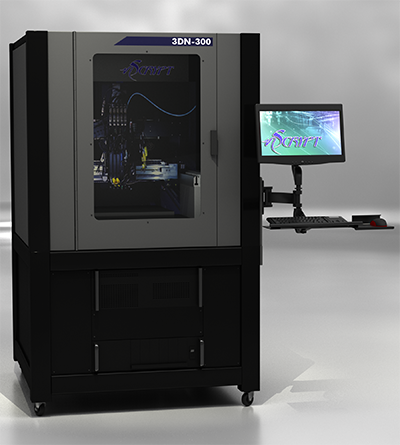It sounds like science fiction, but engineering researchers are working on microscale 3D-printed devices that can be manufactured directly onto fabrics, films and other flexible materials—transforming our idea of “wearable devices” forever.
A group of engineering faculty at FAMU-FSU College of Engineering recently received a one-year, $435,000 grant from the U.S. Army to purchase a custom-designed 3D printer from nScrypt that will allow them to develop microscopic electronic sensors and other devices. With this technology the group of six researchers aim to develop new forms of flexible polymer electrolyte batteries (such as lithium batteries) and thin-film transistors. They will also design direct-print electrodes for wearable devices and other applications, and ceramics and polymers for toughened composites that will enable better ballistic protection materials for the military.
“This acquisition of an unique printing/vision system coupled with laser annealing facility is expected to enhance the capabilities of FAMU-FSU Engineering researchers to work in areas that are of great interest to DOD, such as flexible electronics and sensors,” said Dr. Pani (Chakrapani) Varanasi, chief of the Materials Science Division of the Army Research Office. “At the same time, we expect they will play a critical role in the education and training of minority undergraduate and graduate students in emerging technologies.”

Set to arrive in spring 2020, the custom nScrypt 3D printer combines high-resolution metal and plastic fabrication with optical annealing and a vision system. This includes in-line laser soldering (optical annealing) and a microscope to view products too small for the naked eye, in real time during the 3D printing process. It will be housed in lab space just steps away from the college, at Florida State University’s High-Performance Materials Institute.
With this equipment grant, the team intends to develop high-quality, low-cost flexible electronics, which is critically important to future technologies across a wide range of industries outside the initial military applications, including augmented human performance, sensors, antennas, ballistics and unmanned aerial vehicle systems.
The grant will not only enable new research at the college, but it dovetails with other federally-funded grant work currently underway at the college. For instance, the CREST CoManD center is funded by the National Science Foundation to further research in advanced additive manufacturing by under-resourced graduate students. This new equipment will open new lines of innovation for the CREST participants and their engineering colleagues at both Florida State and Florida A&M universities.
“This grant for a custom-built, high-tech laser 3D printer helps us do more with our existing grant funding,” explained Subramanian Ramakrishnan, professor of chemical and biomedical engineering and lead investigator on the project.
Other members of the team will use the new printer in different, but equally intriguing ways. Daniel Hallinan, associate professor of chemical engineering plans to engineer stronger, smaller lithium batteries with the technology. Okenwa Okoli and Richard Liang, both professors of industrial and manufacturing engineering will work on graphene-based sensors and electrode assemblies, and develop nanoparticle-based embedded electronic devices. Research in the areas of industrial manufacturing and physics will come from FAMU-FSU Engineering associate professor Tarik Dickens, Ph.D. and Komalavalli Thirunavukkuarasu, Ph.D. of FAMU Department of Physics.
In all, the infusion of new equipment not only brings new avenues for innovation, but augments the current research at the college made possible by the National Science Foundation, NASA and the Department of Defense (U.S. Navy).
The award is the result of a merit competition administered by the Army Research Office under policy and guidance of the Office of the Under Secretary of Defense for Research and Engineering (OUSD(R&E)), to increase the capabilities of HBCU/MIs to perform defense research. The Army Research Office is an element of the U.S. Army Combat Capabilities Development Command’s Army Research Laboratory.
